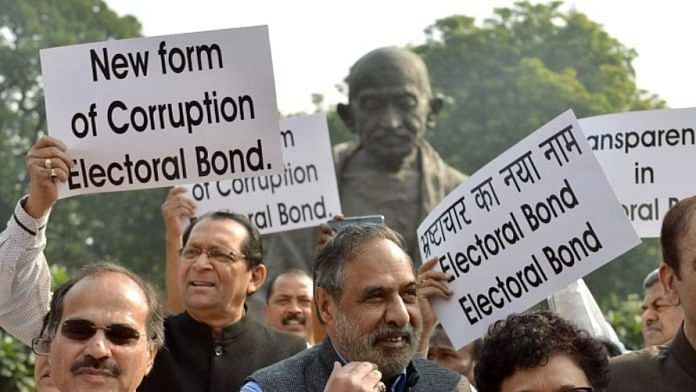Thank you dear subscribers, we are overwhelmed with your response.
Your Turn is a unique section from ThePrint featuring points of view from its subscribers. If you are a subscriber, have a point of view, please send it to us. If not, do subscribe here: https://theprint.in/subscribe/
The Electoral-Bonds-Scheme failed for good reasons. Electoral Bonds don’t solve the problem of influence-peddling, because influence-paddling is profitable to both the special interest and the politician: It’s the business-model of politicians to sell themselves to those keeping them in power.
Meanwhile, the country continues to suffer. Since red tape has restrained the economy, nobody wants to invest in India. The Chief Economic Advisor points to high youth unemployment. Dr. Raghuram Rajan questions the economic success of the current Government and Dr. Sashi Tharoor is wondering whether the nation squanders the much promised demographic dividend.
The source of all the suffering: Political parties, wealthy donors, vote-banks and elite-capture corrupting politicians to ignore the well-being of the public.
Education
In every country teachers-unions boast a lot of political power, which is why no politician dares to question their many privileges. Parents hire after-school tuition-teachers to provide education to their children, because teachers in India don’t even show up to work. The result is poorly educated students. That problem would disappear if primary and higher education be entirely privatized.
Health-care
Medical unions enjoy the same power as teachers-unions. The right solution would have been to abandon medical licensing and deregulate, instead regulations for supposed “safety” make health-care needlessly costly.
The Minimum-Support-Price
Rumor has it Pm Modi back-paddled the reforms of the farm-sector (still the largest employer in the nation) in fear of electoral losses. The BJP MPs walked down like dumb schoolboys to the voting booth to repeal the farm-reforms. Rakesh Tikait knew Indian politicians will never sacrifice their positions for the good of the country.
Infrastructure
It appears the Government missed the ongoing debt crisis in China. The special interests demand infrastructure, but it is doubtful, whether the nation can effort those shiny roads and bridges.
And the list goes on! Special interests always beat ethics-rules in any country, because they threaten the jobs of elected officials.
Don’t buy into this myth, that business-people care more about free-markets than the rest of society. Their donations to politicians are intended to have them pass laws and regulations favorable to their business-interests and cut out the competition. Another big sore: Individual politicians in the Lokh and Rajya Sabha are credibly accused of using their power to shape laws and regulations to benefit themselves rather than the country.
Economists, from Dr. Rajan to Dr. Nageswaran, would propose reasonable solutions. What nobody seems to ask: Why should any politician do the right thing, if doing so would likely result in electoral losses? Electing better people won’t do the trick, because the bad incentives are still in place! However, without elections the power of political backers would render meaningless, because the incentive-structure would change. Then politicians no longer eagerly grow Government to please their backers, but fear being sued for not reducing Government enough.
Add to the Constitution strong libertarian statutes, because better Government isn’t good enough. History offers a clear verdict: Small Government is what fixes a nation. Sortition and libertarianism go hand in hand. Indeed, liberal societies are the only ones to ever succeed! Additionally, any future Constitution must include the highest ethics-standards enforceable in a Court of law: No income besides Government-salary, no immunity, transparent legislative processes, etc.. Jharkhand already implemented version of Sortition in its Parliament, so did Ireland and Germany. Elections don’t produce better politicians than randomly picking them in a lottery; they became entertainment, not serious recruitment-mechanisms.
PM Modi isn’t Thatcher, Netanyahu or Milei. The hype around Pm Modi is fading, his reputation took a hit after the repeal of the farm-laws, other reforms are put on hold, etc.. Even the winning BJP has realized the nation is failing. The current system shows itself un-salvageable. Pm Modi still has a shot to become a historical leader, if he changes the Constitution altogether instead of desperately trying to win elections for his party.
A valid strategy to transition is to have Parliamentarians remain in their seats for the next 10 years without facing an election. In the mean time, a registry with suitable future politicians shall be established. Vacancies during or after that time will then be filled with the entries from that registry.
Schedule the date for the next election for President to replace both the current President and Pm simultaneously; candidates for this election must come from said registry.
The story of the Electoral-Bond-Scheme is reminiscent of the story of Juicero, a Silicon-Valley-company promising a high-tech juicer making fresh juice. It turned out: One does not need that machine at all, only its pouches. This incident sparked a debate about over-engineering. The Electoral-Bond-Scheme is an over-engineered solution to a problem, that may not have existed, if Government switched from Elections to Sortition, where Parliamentarians don’t owe their positions to political backers.
Elections may turn out to be useless, like Juicero.
These pieces are being published as they have been received – they have not been edited/fact-checked by ThePrint

